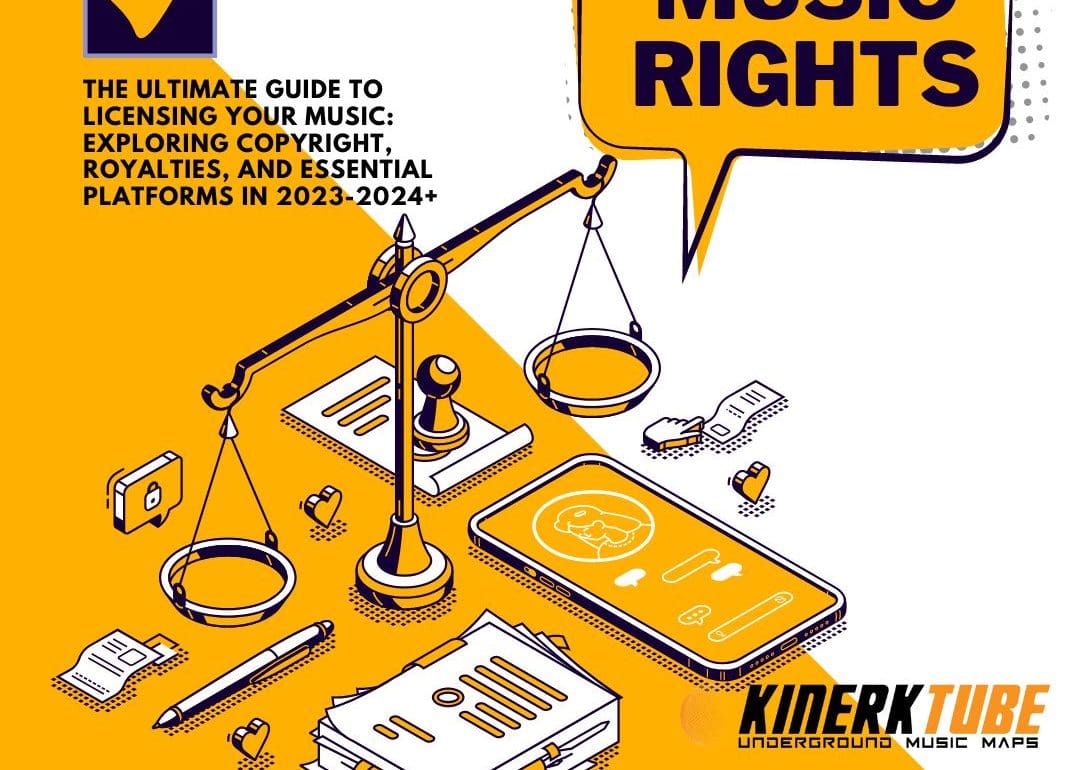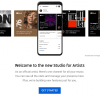
Introduction:
Licensing your music is a powerful way to gain exposure, earn royalties, and expand your fanbase. In this comprehensive guide, we’ll delve into the intricacies of copyright and royalties while exploring the best licensing options available for film, radio, and streaming platforms in 2024. From established organizations like ASCAP and CD Baby to emerging platforms like Songtradr and Musicbed, we’ll cover a wide range of sites to help you navigate the licensing landscape successfully. So, let’s dive in and unlock new possibilities for your music!
Understanding Copyright and Royalties:
Before delving into licensing, it’s crucial to understand the concepts of copyright and royalties. Copyright grants exclusive rights to the creators of original musical works, protecting them from unauthorized use and reproduction. As the copyright owner, you have control over how your music is used and the ability to monetize it.
Music royalties are payments made to artists, songwriters, composers, and other music rights holders for the use of their music. These royalties are typically generated when music is played, performed, reproduced, or distributed through various mediums. There are several types of music royalties, and here are the main ones:
- Performance Royalties:
Performance royalties are earned when a song is performed publicly, either live or through broadcast media. This includes plays on radio, TV, live concerts, music streaming services, and other public venues. Performance royalties are collected by Performance Rights Organizations (PROs) such as ASCAP, BMI, SESAC (in the US) and PRS for Music (in the UK). These organizations track and collect royalties on behalf of their affiliated songwriters and music publishers. - Mechanical Royalties:
Mechanical royalties are earned from the reproduction and distribution of music recordings. Whenever a song is sold or streamed through CDs, vinyl, digital downloads, or interactive streaming services, the artist and songwriter receive mechanical royalties. Mechanical royalties are typically administered by music publishers or organizations like the Harry Fox Agency (HFA) in the United States. - Synchronization (Sync) Royalties:
Sync royalties are earned when music is synchronized with visual media, such as TV shows, movies, commercials, video games, and online videos. The owner of the musical composition (usually the songwriter or music publisher) receives a synchronization fee for the use of their music in these visual productions. Sync licensing deals are negotiated on a case-by-case basis, and the fees can vary widely depending on the popularity of the song and the scope of the usage. - Print Music Royalties:
Print music royalties are earned when sheet music or musical scores are sold or distributed. These royalties go to the songwriter, composer, or music publisher, depending on their respective rights in the composition. - Digital Performance Royalties:
Digital performance royalties specifically pertain to the digital transmission of music on internet radio, satellite radio, and online streaming services. In the United States, these royalties are collected and distributed by SoundExchange, which represents both recording artists and record labels. - Grand Rights Royalties:
Grand rights royalties apply to the use of music in theatrical performances, operas, ballets, and other dramatic presentations. These performances involve more substantial use of the music than typical sync licenses and require special permissions and royalties. - Public Performance Royalties for Recordings:
In some countries, there are separate performance royalties for recordings (e.g., sound recordings) distinct from the performance royalties for musical compositions. These royalties are paid to recording artists and record labels.
It’s important to note that music royalty structures can vary significantly between countries, and the specific terms of royalty agreements are subject to negotiation between artists, publishers, and those using the music. Also, the emergence of new technologies and platforms may lead to new forms of royalties in the future.
Essential Licensing Platforms and Organizations:
- ASCAP (https://www.ascap.com/): ASCAP, the American Society of Composers, Authors, and Publishers, is a leading PRO that represents songwriters, composers, and music publishers. They provide comprehensive licensing solutions for music in film, TV, and various other mediums. ASCAP helps collect performance royalties for artists when their music is publicly performed.
- BMI (https://www.bmi.com/): Broadcast Music, Inc. (BMI) is another prominent PRO that supports songwriters, composers, and music publishers. BMI offers licensing services for music used in film, TV, radio, and digital media, ensuring artists receive the appropriate royalties for their performances.
- SOCAN (https://www.socan.com/): SOCAN is the Society of Composers, Authors, and Music Publishers of Canada. It is Canada’s leading PRO, representing music creators and publishers. SOCAN helps Canadian artists collect performance royalties globally and offers licensing solutions for various platforms, including film, TV, and radio.
- SoundExchange (https://www.soundexchange.com/): SoundExchange specializes in digital performance royalties. As a digital PRO in the United States, SoundExchange collects and distributes royalties for artists when their music is streamed on digital radio platforms such as Pandora and SiriusXM.
- Songtrust (https://www.songtrust.com/): Songtrust is a music publishing administration platform that helps artists and songwriters collect royalties worldwide. They offer comprehensive solutions for music licensing, ensuring that artists receive their fair share of royalties when their music is used in various mediums.
- Resound (https://www.resound.ca/): Resound represents performers and record labels in Canada and advocates for their rights to earn royalties for their performances. They focus on neighboring rights royalties, which are earned when recorded music is publicly performed, such as on radio and in public venues.
- Camera (https://www.camara.cl/): Camera, based in Chile, is a collective management organization that licenses and collects royalties for public performance and broadcasting rights. They work to protect the rights of creators and ensure they receive fair compensation for their work.
Other Noteworthy Licensing Platforms:
- Songtradr (https://www.songtradr.com/): Songtradr is a global music licensing platform that connects artists with opportunities in film, TV, advertising, and more. With an extensive network of music supervisors and a user-friendly platform, Songtradr is an excellent choice for musicians looking to license their music for various media projects.
- CD Baby (https://www.cdbaby.com/): CD Baby, a well-known distribution service, also offers licensing opportunities for film, TV, and other media placements. Their comprehensive solutions allow artists to distribute their music while exploring licensing possibilities simultaneously.
- Epidemic Sound (https://www.epidemicsound.com/): Epidemic Sound is a prominent royalty-free music platform that collaborates with filmmakers and content creators worldwide. Joining their platform allows artists to license their music for use in films, ensuring appropriate compensation and exposure.
- Artlist (https://artlist.io/): Artlist is a comprehensive music licensing platform that specializes in providing high-quality music for filmmakers, video creators, and other creative projects. Artists can join Artlist to showcase and license their music to a wide range of visual media projects.
- Getty Images Music (https://www.gettyimages.com/music): Getty Images Music is a renowned platform that connects musicians with licensing opportunities for use in commercials, films, TV shows, and more. Their extensive library and global reach make it a valuable resource for licensing your music.
- Musicbed (https://www.musicbed.com/): Musicbed is a popular licensing platform that focuses on providing high-quality music for filmmakers, brands, and agencies. Joining Musicbed allows artists to showcase and license their music to a diverse range of visual media projects.
- Marmoset (https://www.marmosetmusic.com/): Marmoset is a licensing agency that curates and licenses music for advertising, films, and other media projects. Their handpicked music catalog and personalized approach make them a valuable partner in licensing your music.
Utilizing KinerkTube for Music Promotion:
While not a licensing site, KinerkTube offers a unique and powerful promotional platform for musicians. As a promotional social music network, KinerkTube allows artists to embed their DSPs (Digital Service Providers) and merchandise, connect with other artists, fans, and brands, and gain visibility in the music industry. It serves as an all-in-one solution for showcasing music, engaging with fans, and growing music businesses.
Conclusion:
In 2023, musicians have a plethora of options for licensing their music for film, radio, and streaming platforms. Understanding copyright, royalties, and the various licensing platforms available is crucial for maximizing opportunities and earning fair compensation for your work.
From established organizations like ASCAP and BMI to emerging platforms like Songtrust and Artlist, each platform offers unique benefits and licensing solutions. By leveraging these platforms and joining PROs such as SOCAN or Resound, you can protect your rights and ensure you receive proper royalties when your music is performed publicly.
Remember, licensing is a powerful tool for gaining exposure, generating revenue, and expanding your fanbase. Combine licensing with effective promotion on platforms like KinerkTube to maximize your music’s reach and potential. Embrace the opportunities, explore the recommended platforms, and watch your music thrive in the dynamic world of licensing and promotion.





